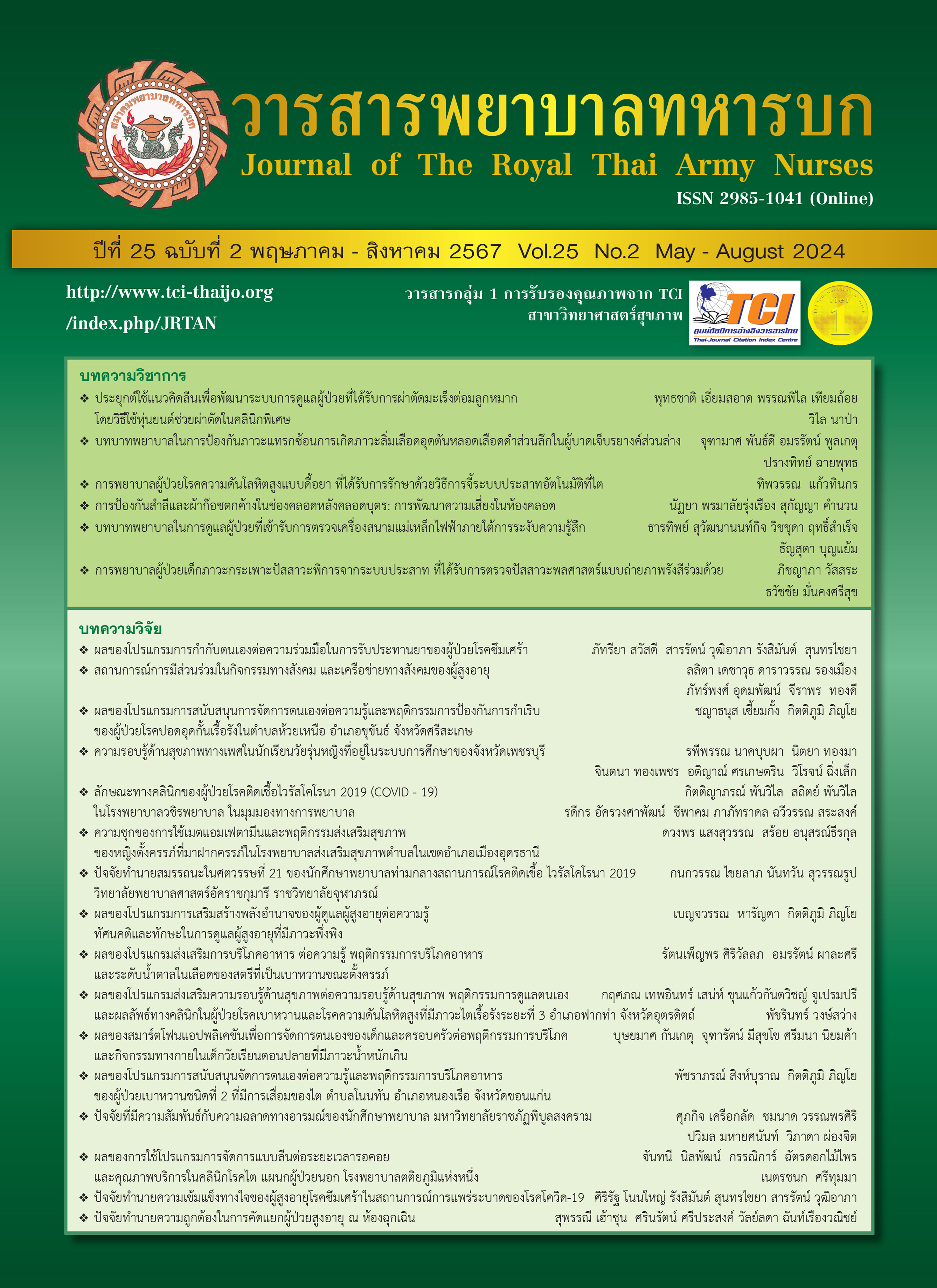The Effects of Virtual Reality-Choice Theory Program on Self-Control and Online Game Addiction Among Children Diagnosed with Risk of Online Game Addiction
Keywords:
Self-control, Online game addiction, Choice theory, Virtual realityAbstract
This quasi-experimental research aims to examine the impact of the integrated program based on choice theory and virtual reality on self-control and online game addiction among children diagnosed with online risk game addition. The samples were the 10-12 years old children who had diagnosed with online risk game addition and voluntarily participated in the trial. A total of 32 participants were randomly divided into the experimental group and the control group. Each group composed of 16 child. There were 3 research instruments, such as 1) the integrated program based on choice theory and virtual reality for enhancing self-control and decreasing online game addiction (CVRP), which was designed by the researcher. The CVRP composed of 8 sessions of the psychological and brain training activities, each lasting 50 minutes, conducted twice a week for 3 weeks. 2) Brief Scale of Self-Control (BSCS), and 3) Game addiction screening test (GAST). Data analysis employed Repeated-measures analysis of variance: One between-subject variable and one within-subject variable. Pairwise mean comparisons were conducted using the Bonferroni method.
The results found that. The experimental group had higher self-control after the experiment and the follow-up period than before the experiment. and higher than the control group statistically significant (P<0.05). The experimental group had lower online game addiction after the experiment and the follow-up period than before the experiment. and higher than the control group statistically significant (P<0.05).
Downloads
References
Chumpanin K. Guideline for A Enhancing Digital Citizenship of Students in Secondary School. Journal of Educational Administration, Khon Kaen University 2021;16 (1) :116-27.(In Thai)
Krossbakken E., Torsheim T., MentzoniR A., King D., Bjorvatn B., Lorvik L., & Pallesen S. The effectiveness of a parental guide for prevention of problematic video gaming in children: A public health randomized controlled intervention study. Journal of behavioral addictions. 2018;7(1), 52-61.
Kuss D., Griffiths M., & Pontes., H. DSM-5 diagnosis of Internet Gaming Disorder: Someways forward in overcoming issues and concerns in the gaming studies field: Response to the commentaries. Journal of behavioral addictions. 2017;6(2),133-41.
Dingman M, Your brain, explained: what neuroscience reveals about your brain and its quirks;Hachette.UK, 2019.
Visesrit U. Effects of Self-control Program of Game Online Addiction of Upper Secondary EducationStudents at Prakhonchaipittayakhom School in Buriram Province. (thesis). Nakhon Ratchasima: Nakhon Ratchasima Rajabhat University; 2018. (in Thai)
Haenjohn J. Cognitive psychology (3thed). Bangkok, Grandpoint, 2021. (in Thai)
Rattanatamtong A., Haenjohn J., Supwirapakorn W. Development of Online Acceptance and Commitment Program to Enhance Inhibitory Control on Cyberbullying in Adolescents, Journal of The Royal Thai Army Nurses 2023;24(1):80-90. (in Thai)
Haenjohn J. Impact of Cognitive Training Program on Executive Functions and Working Memory in Teachers in Eastern Economic Corridor. Journal of the Royal Thai Army Nurses. 2022;23(2): 218-28. (in Thai)
Psotka J. Immersive training systems: Virtual reality and education and training. Instructional science, 1995.
Uwanno T. Attitude. In the Encyclopedia of Psychology, Volume 1, Letters A – B, Royal Society Edition. Bangkok: Royal Society of Thailand; 2015. (in Thai)
Vilamart K., Haenjohn J., Sirithadakunlaphat S. Development of Program for Promoting Executive Functions of the Brain by NeuroLinguistic Programming for Secondary School Students With Internet Addiction. Journal of the Royal Thai Army Nurses. 2020;22(3) : 237-46. (in Thai)
Park S, Kim S, Roh S, Soh M, Lee S, Kim H, Han D.The effects of a virtual reality treatment program for online gaming addiction. Computer methods and programs in biomedicine. 2016.
Kock N. Virtual Reality Technology, Texas A&M International University USA, International journal of e-collaboration, 2006.
Verkuyl, M., Romaniuk, D., & Mastrilli P. Virtual gaming simulation of a mental health assessment: A usability study. Nurse Education in Practice,2018.
Cieślik B., Mazurek J., Rutkowski S., Kiper P., Turolla A., & Szczepańska-Gieracha J. Virtual reality in psychiatric disorders: A systematic review of reviews. Complementary Therapies in Medicine.2020.
Pornnoppadol C., Sornpaisarn B., Khamklieng K., & Pattana-amorn S. The Development of Game Addiction Screening Test (GAST). J Psychiatr Assoc Thailand. 2014;59(1): 3-14. (in Thai)
Faul F, Erdfelder E, Buchner A, & Lang, A.-G. Statistical power analyses using G*Power 3.1 Tests for correlation and regression analyses. Behavior Research Methods;2009.
Lindner C., Nagy G. & Retelsdorf J. The Dimensionality of the Brief Self-Control Scale – An Evaluation of Unidimensional and Multidimensional Applications. Personality and Individual Differences. 2015.
Thanasuwannathan S, Yu-iam S, & Koolnaphadol K. The Effects of Reality Group Counseling on Undergraduate Students’ Game Addiction Behavior. Journal of Education Studies, Burapha University.2019:1(2):46-61(In Thai)
Glasser W. Choice theory: A new psychology of personal freedom. Harper Collins, New York; 1998. 21. Glasser W. Reality therapy in action. Harper Collins, New York; 2000.
Corey G. Theory and practice of counseling and psychotherapy (10th ed.). Cengage Learning, Boston, USA; 2018. 23. Glasser W. Take charge of your life: How to get what you need with choice theory psychology. iUniverse Publishing, Bloomington, Indiana; 2011.
Downloads
Published
How to Cite
Issue
Section
License
Copyright (c) 2024 Journal of The Royal Thai Army Nurses

This work is licensed under a Creative Commons Attribution-NonCommercial-NoDerivatives 4.0 International License.
บทความหรือข้อคิดเห็นใดใดที่ปรากฏในวารสารพยาบาลทหารบกเป็นวรรณกรรมของผู้เขียน ซึ่งบรรณาธิการหรือสมาคมพยาบาลทหารบก ไม่จำเป็นต้องเห็นด้วย
บทความที่ได้รับการตีพิมพ์เป็นลิขสิทธิ์ของวารสารพยาบาลทหารบก
The ideas and opinions expressed in the Journal of The Royal Thai Army Nurses are those of the authors and not necessarily those
of the editor or Royal Thai Army Nurses Association.






